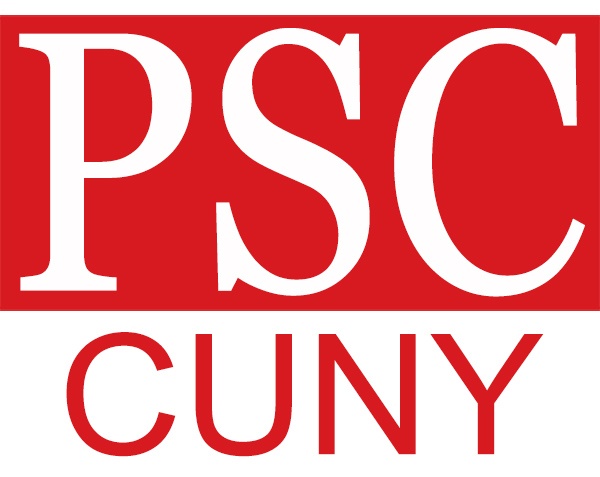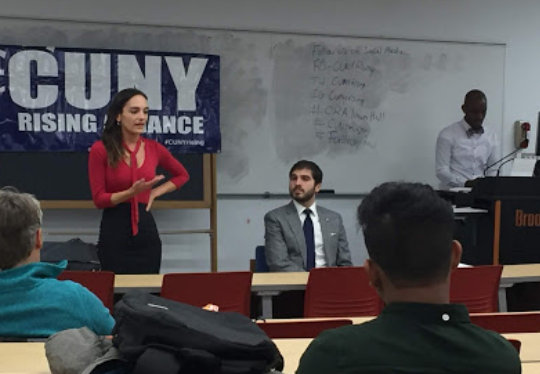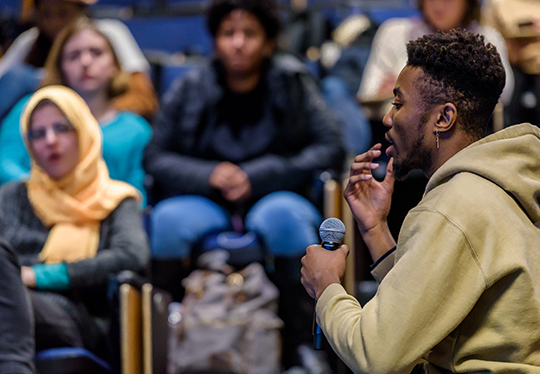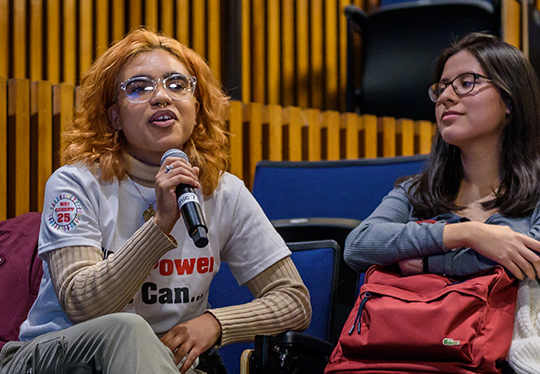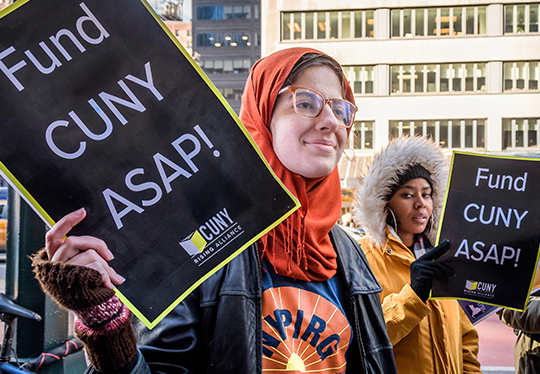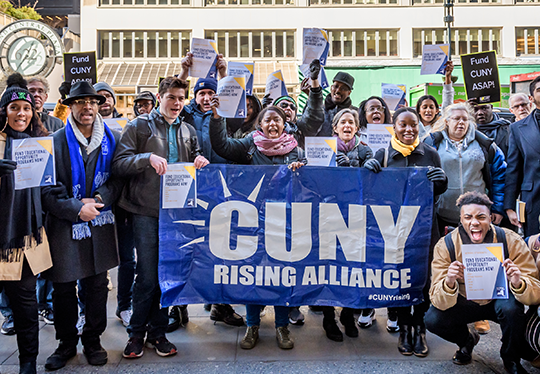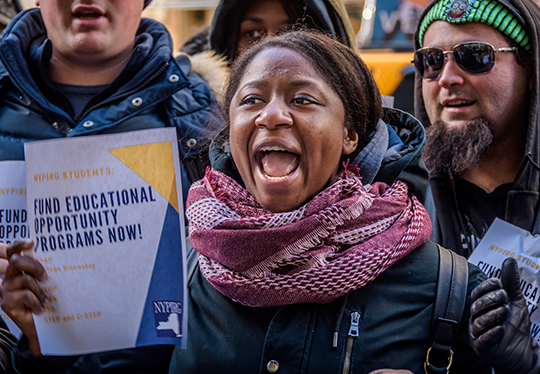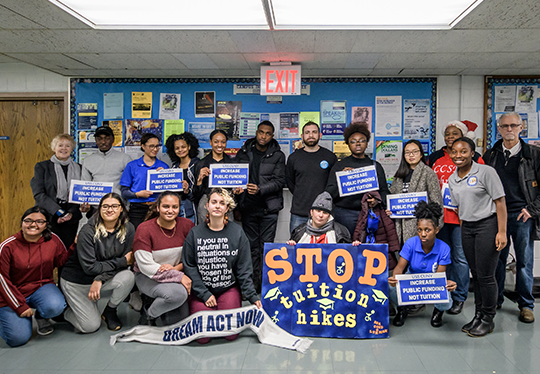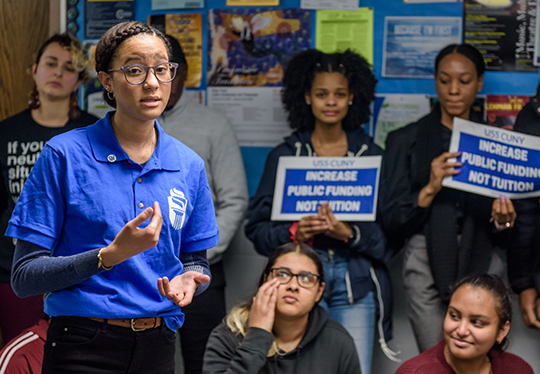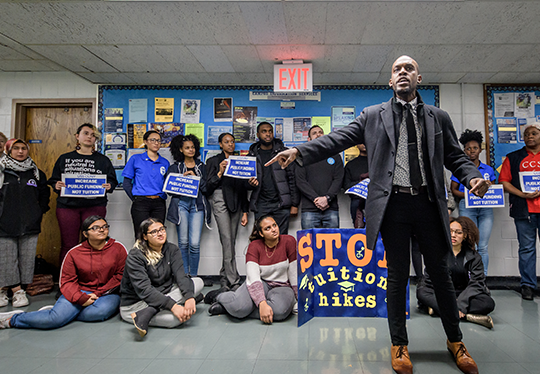Join the Social Media Action Team | State Budget Campaign Calendar | PSC's Budget Platform | PSC Summary of the Budget Request | Testimony to the Board of Trustees | TAP Gap Fact Sheet | Testimony on the State Executive Budget for CUNY | Past Budget Campaigns
Caravan to Stop Layoffs and Fund CUNY
Union Protests as Trustees Meet
CUNY faculty and staff working the the PSC staged a mobile, socially distant protest throughout Midtown on Monday, May 18, the day of the CUNY Board of Trustees meeting. Riding in cars and well-spaced bicycles, the protestors traveled from CUNY’s central office on East 42nd Street, past Governor Cuomo’s NYC office and on to Billionaires’ Row to demand a halt to layoffs and new taxes on the wealthy to protect public education. [Click here for slideshow of caravan.]
More images from yesterday’s event courtesy of @Vnina #CutCOVIDnotCUNY #MakeBillionairesPay
Caravan to Save Jobs and Fund CUNY pic.twitter.com/9hfEz9V6y5— PSC_CUNY (@PSC_CUNY) May 19, 2020
CUNY Adjuncts, Union, AOC and NYS Lawmakers Demand Jobs and New Taxes on the Rich
Adjuncts teach 56% of courses at CUNY, cuts put education for hundreds of thousands of low-income New Yorkers at risk
In recent days, CUNY colleges have announced planned layoffs of hundreds of CUNY adjuncts, in anticipation of State budget cuts caused by the COVID-19 Recession. Adjuncts and their union were joined today by Congresswoman Alexandria Ocasio-Cortez and several New York State legislators to oppose cuts to CUNY and demand new taxes on the rich. Adjuncts teach 56% of courses at CUNY. Mass layoffs put the education of hundreds of thousands of low-income New Yorkers at risk. Read more.
Enacted New York State Budget for CUNY
The PSC’s vigorous advocacy over several years helped to protect the CUNY budget from cuts in the budget enacted on April 3, despite a multi-billion dollar State budget deficit. While the State budget enacted during the coronavirus pandemic does not cut CUNY funds, it does keep operating funding for the CUNY senior and community colleges largely flat. An exception to the flat budget is that the new adjunct office hours at the senior colleges have been funded, consistent with the commitment made by the governor’s office. (Funding for the adjunct office hours at the community colleges was included in the mayor’s preliminary budget, released in January.) The progress the union had made in gaining legislative support for adding tens of millions of dollars to close the TAP Gap, however, did not come to fruition because of the emergency budget. We were very close to winning additional funding, and we will build on this year’s progress next year.
But there may be more budget battles even before next year’s session. Three new factors could have a major impact on CUNY’s funding in the coming months. First, the economy: the massive unemployment and economic downturn resulting from the pandemic is expected to lead to a loss of state tax revenue of between $10 billion and $15 billion over the coming year. Second, the enacted budget gives the governor’s office unilateral power to cut budgets across the board or for individual agencies during FY 2021, in response to revenue shortfalls or higher-than-projected spending. Third, a mitigating factor may be federal stimulus money, including money allocated directly to public colleges, as well as newly available short-term loans for state and local governments to offset the effects of the epidemic. The legislation authorizing the federal stimulus funds for higher education also includes requirements for maintaining State funding for higher education.
The union’s immediate challenge will be to monitor the use of these federal funds. The PSC leadership is already engaged in this work and is in discussion directly with Congressional leadership. The next challenge, for which the strength of the whole union will be needed, will be to resist any cuts to CUNY that may be proposed in the coming months. After years of inadequate funding, CUNY cannot sustain further cuts, even in a period of austerity. The pandemic has revealed how critical public schools and colleges are to the economy as a whole. Another challenge will be to press for longer-term solutions from the federal government, even beyond the stimulus money. Finally, PSC members will need to continue to demand a structural solution to the shortfalls and inequality in the State budget even before the pandemic hit: fair taxation of those who can most afford to pay. Higher taxation of wealth has been part of the solution of many other major economic crises, from the Great Depression to September 11th to the 2008 recession.
Senior Colleges
- There are no cuts to State funding for the senior colleges; funding remains largely flat at $552 million, except for additional fringe benefit coverage and funding for the adjunct office hours negotiated in the recent contract. But most of the University’s FY2021 cost increases for collective bargaining, energy, rent and other operating costs are not funded.
- Without funding to cover these costs, the senior colleges could face additional austerity. Several colleges ended last year with reserve funds, however, and those funds should be used if needed.
- As in the Executive Budget and previous budgets, the FY2021 budget includes modest amounts for Open Educational Resources ($4 million), to provide free access to textbooks for students; and for an approved spending plan by the Board of Trustees ($12 million), a portion of which may be used to support classroom faculty.
- The budget for FY2021 assumes there will be a $200 tuition increase next fall, but it denies the governor’s proposal to provide authorization now for senior college tuition increases in subsequent years.
- The $120 “wellness fee” proposed by the CUNY administration does not require authorization by the State legislature. CUNY management has not yet issued further information concerning the fee.
- SEEK, CUNY’s opportunity program for senior colleges, is allocated the same funding as last year, including the increase negotiated by the legislature last year.
- The School of Labor and Urban Studies is allocated the funding at same level as last year. The Executive Budget proposal to cut funds from this program was rejected by the legislature.
- There is a $50.7 million increase in the budget under the heading of Fringe Benefits.
Community Colleges
- CUNY community colleges will receive the same rate of $2,947 per full-time-equivalent student under the enacted budget, but declining FTE enrollment at the community colleges will result in a reduction in total funding next year.
- The enacted budget assumes an enrollment decline of roughly 1,200 FTE students at the community colleges and a resultant $3.6 million reduction in community college funding.
- The enrollment/funding estimate does not account for how the coronavirus pandemic will affect enrollment or for ways that CUNY faculty and staff have already begun to work with students to help them to stay enrolled next year.
- The planned $200 tuition hike at the CUNY community colleges does not require authorization by the State legislature.
- College Discovery, CUNY’s opportunity program for the community colleges, is allocated the same funding as last year.
- ASAP, rental aid and CUNY childcare centers are all allocated funds at the same level as last year, maintaining increases advocated by the PSC and included by the legislature last year. Executive Budget proposals to cut these programs were rejected by the legislature.
Capital Budget
- The enacted budget provides $284 million for critical maintenance at CUNY senior colleges and $64.3 million for critical maintenance at CUNY community colleges. The community college funding must be matched by a City allocation.
- The enacted budget creates a new $300 million matching program to fund new construction and/or major renovations at CUNY senior colleges. The program requires that for every $2 invested by the State, campuses contribute $1 toward project costs.
Financial Aid
- The governor’s Executive Budget proposal to increase the income eligibility threshold for the Excelsior Scholarship from $125,000 to $135,000 in FY2021 was not included in the enacted budget.
- The TAP Gap is not addressed in the budget.
- In FY2021 the State will continue to underfund financial aid for CUNY’s senior college TAP recipients, and the colleges will lose out on more than $80 million in revenue.
- Both the Senate and the Assembly were poised to push for partial restoration of the TAP Gap before the coronavirus pandemic led to a $15-billion drop in state revenue projections.
No New Taxes for the Rich; Potential Mid-Year Budget Cuts for CUNY
- New York State’s tax revenue is projected to fall by $10 billion to $15 billion over the next year.
- The enacted budget includes no new revenue-raising measures. Billionaires and the ultra-rich will continue to pay a lower effective tax rate than other New Yorkers.
- The budget authorizes the governor’s director of the budget, CUNY Trustee Robert Mujica, to unilaterally reduce appropriations at three points during the fiscal year if state tax receipts fall further or if spending rises more than expected.
- The PSC will be focused on preventing cuts to CUNY this year.
Federal Stimulus Money for CUNY
- The most recent federal stimulus includes $14 billion in funding for institutions of higher education, including more than $235 million to be distributed among the CUNY colleges.
- The allocation is based on the number of students in a college and the number of Pell-grant recipients, so the allocation to CUNY is appropriately higher than for institutions with smaller numbers of low-income students.
- At least half of the stimulus funds are designed to go directly to students; the remaining funds will be subject to guidance that has yet to be promulgated by the Department of Education.
- The stimulus funds are one-time cash infusions, not recurring funds for the colleges.
- The PSC leadership is actively engaged in discussions with Senator Chuck Schumer’s office and our national affiliate, AFT, on the distribution of stimulus funds to CUNY and on proposals for additional higher education funding in the next federal stimulus bill.
Send a Letter to Governor Cuomo: Pandemic Budget Must Tax the Ultra-wealthy
The recent $2 trillion bailout by federal government to mitigate the public health and economic fallout of COVID-19 is both welcome and necessary but not sufficient. The funds will certainly help New York State but state legislators must also do their part in allocating additional resources to protect the health of citizens and invest in public sector job preservation and creation. This can be accomplished through new progressive forms of taxation.
Please read and sign this letter that calls on Governor Cuomo to do the one thing that will make a real difference now and into the future. He must show true leadership and create new revenue by taxing the ultra-wealthy and lifting the 2% spending cap. Only in this way is there a chance that CUNY will be able to continue to give students the education they deserve, and, by doing so, to support and help build the economy.
Budget Emergency Day, March 12
Wear #RedforEd and Take Action
The budget emergency at CUNY is sabotaging our students, our work, our health, our future. It's time we transferred the crisis to Albany by taking action together. Everyone can do something on March 12 to stop the starvation of CUNY. Tell us here that you will wear #redfored and take at least one action on Thursday, March 12 to demand an end to the budget crisis. You can join a protest on your campus, post a #redfored selfie, call or email your legislators, or mobilize for a rally outside a legislator’s district office. The state budget will be decided by April 1. This is the time to act!
Faculty, Students Demand “New Deal” for CUNY and SUNY to End Higher Ed Funding Crisis
Hundreds Rally at Capitol for Higher Education Action Day
700 college students, faculty and staff rallied alongside Assembly Speaker Carl Heastie, Majority Leader Andrea Stewart-Cousins and other lawmakers in Albany on February 27 during a statewide Higher Education Action Day held by groups mobilizing to end the funding crisis at the State University and the City University of New York—SUNY and CUNY.
The groups’ joint platform says “SUNY and CUNY need a new deal, not another year of flat operating budgets, tuition hikes and increasing tuition dependence.” They want increased public funding and a fully funded tuition freeze, not underfunding and program cuts. Read more.
Tell Albany to Stop Starving CUNY!
When Will New York Stop Starving CUNY?
Dozens of PSC members were in Albany February 3-4 demanding $232.6 million for CUNY in next year’s State budget and a fundamental change to the way CUNY is funded in the years ahead. We need a New Deal for CUNY, not more flat funding and tuition hikes. Click here for the PSC’s priorities for next year’s budget.
At a hearing Tuesday, February 4 President Bowen testified before the members of the Senate and Assembly committees on higher education and finance.
“New York’s current policy on CUNY funding is impoverishment by design. ... We call on you to refuse to pass a budget unless it includes new revenue from progressive taxation and covers CUNY’s basic operating costs—without raising tuition,” she said.
Watch video of testimony from NYSUT, UUP and PSC.
Fix CUNY
PSC President Barbara Bowen and Treasurer Sharon Persinger testified before the NYS Senate Higher Education Committee at a hearing focused on the capital needs of SUNY and CUNY. (Their testimony begins at the 48:40 timestamp of this video.) Enrollment at CUNY has increased 40 percent since 2000, but college facilities have not been expanded and improved to adequately accommodate CUNY’s enlarged student body. Maintenance on many of CUNY’s 300 buildings has also been long deferred. CUNY’s five-year Capital Budget Request calls for $4.5 billion in State funding (see page 23 of the University Budget Request).
President Barbara Bowen testified in support of the five-year plan and focused on the need for critical maintenance citing examples from Brooklyn College and Hunter College. “Lack of investment in critical maintenance sends a material message to our students that New York doesn’t care about their education,” she said. “It actively undermines the project of teaching and learning at CUNY.”
Treasurer Sharon Persinger described in painful detail the degraded conditions at her campus, Bronx Community College, and urged the Legislature to fix CUNY. “We need funding for basic heating system maintenance, for equipment upgrades that are required, and for the staff to see that those systems run correctly.”
CUNY student leaders delivered moving testimony about the state of their campuses and showed the Senators dozens of photos of crumbling facilities (time stamp 1:30:00).
CUNY Budget Request for 2020-2021
PSC officers, union members and student leaders testified last night at a Board of Trustees hearing on CUNY’s University Budget Request for academic year 2020-2021. The University is requesting an additional $277.4 million above the current operating budget, a 7.5% increase. The proposed increase in the operating budget would be funded by increases from the State, the City, and CUNY students. A $200 per year tuition hike at both senior and community colleges is proposed, along with a new $120 “Health and Wellness” fee. The request asks the State and City cover CUNY’s $178.5 million in mandatory cost increases for rent, campus maintenance, fringe benefits and several contract settlements, including the PSC’s. The tuition hike and fee increase would fund new hiring, programs and student support services, if the mandatory costs are covered. CUNY's Draft Budget Request | PSC Summary of the Budget Request
Sign Up Now for Lobby Day Days Scheduled in February and March
The PSC is partnering with NYSUT, United University Professions (UUP) and student organizations like NYPIRG and USS to organize meetings with lawmakers about the need to increase funding for CUNY and keep college affordable. Three actions in Albany are already scheduled: Register by Friday, January 4 for NYSUT’s statewide Higher Education Lobby Day scheduled for the evening of Monday, February 3 and Tuesday, February 4. The annual Student/Faculty/Staff Higher Ed Action Day will be Thursday, February 27 and the NYSUT Committee of 100 Lobby Day will be Monday and Tuesday, March 2-3. Transportation, food and hotel costs for the NYSUT Higher Education Lobby Day (February 3-4) and the NYSUT Committee of 100 (March 2-3) are covered by NYSUT. Members can also make the round trip to Albany in one day with students on the buses for the Student/Faculty/Staff Higher Ed Action Day (February 27). Click here to register and for more information.
Testimony on the University Budget Request
On December 9 PSC officers, union members and student leaders testified at a Board of Trustees hearing held at Lehman College on CUNY’s University Budget Request for academic year 2020-2021.
At the hearing, President Barbara Bowen urged the Board to stake out a different position demanding full public funding for CUNY, no tuition and fee increases and a plan for adding the number of full-time faculty and counselors that CUNY actually needs. “The PSC urges you to submit a budget request worthy of the urgency students, staff and faculty feel about CUNY, one that has the courage to demand—and secure—the public investment CUNY needs,” she testified. Read the full testimony of President Bowen and other PSC leaders. Watch videos of student, faculty and staff testimony and clips from a pre-hearing press conference on the University Student Senate and CUNY Rising Twitter feeds.
